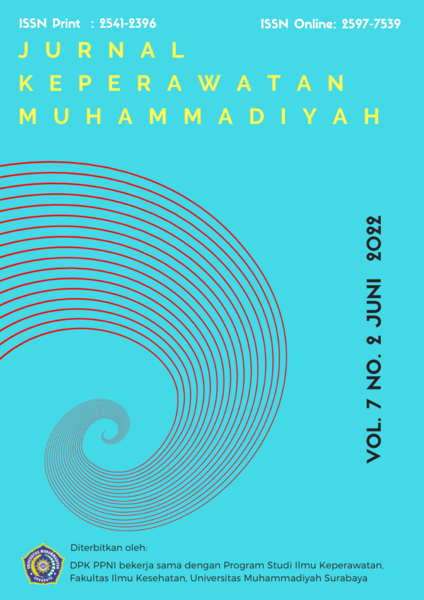Memahami Stigma Keluarga HIV-AIDS Melalui Straussian Grounded Theory
DOI:
https://doi.org/10.30651/jkm.v4i2.2407Keywords:
stigma. Keluarga, Penderita HIV-AidsAbstract
HIV-AIDS has severe psychological effects on families of sufferers or people living with HIV in seeing themselves and / or other people. HIV-AIDS experienced by someone causes many psychological consequences. Stigma develops through internalization by PLWHA with negative perceptions about themselves and how they put themselves in the perspective of negative views by others towards them. The purpose of this study is to understand how the stigma of HIV-AIDS families in their daily lives. The purpose of this study was to understand the stigma of the HIV-AIDS family (PLWHA) in West Sumatra with a qualitative approach through the Straussian Grounded Theory. This study uses a qualitative method with Strauss's grounded theory approach. Conducted from 2 to 15 July 2018 Methods of data collection in this study are semi-structured interviews, review documents and field notes. Data analysis methods: open coding, axial coding, selective coding. The results of the study found five categories: Denail. Low self-esteem, social isolation, fear and support systems. These categories form a theory and deep understanding of the stigma of families with people with HIV-AIDS. The results of the study can be used as a basis for health workers, especially in providing nursing, education and research services. The results of this study have implications for families, communities, health workers, communities and other relevant parties in an effort to deal with the stigmatization of the HIV-AIDS family. This research is expected to produce output in the form of journal publications in non-accredited scientific journals and textbooks
Keywords : self care deficit nursing theory
Â
References
DAFTAR PUSTAKA
Abdullah, A. F. (2008). Membangun Positive Thinking Secara Islam. Gema Insani: Jakarta.
Ahmedani, B.K. (2011). Mental Health Stigma: Society, Individuals, & the Profession.Journal of Social Work Values & Ethics, 8, 2.
Amalia, L. (2010). Mental health illness: Who cares? Jogyakarta Indonesia: School of Medicine Gadjah Mada University.
Asmauryanah, R. (2014). Pencegahan Penularan HIV Dari Ibu Ke Bayi Di Puskesmas Jumpandang Baru Makassar.Bagian Epidemiologi Fakultas Kesehatan Masyarakat Universitas Hasanuddin Tesis. Makassar: Universitas Hasanuddin
Bappeda Provinsi Sumatera Barat, (2014). Kejadian Pelaksanaan Jalan RPJMD Provinsi Sumatera Barat tahun 2015-2020.
Creswell, J.W. (2009). Research design. Qualitative, quantitative & mixed methods approaches. Thousand Oaks, CA: Sage.
Depkes RI. (2015). Statistik Kasus HIV/AIDS di Indonesia, Dirjen PPM & PL Depkes RI, Jakarta
Daulima, N.H.C. (2014). Proses pengambilan keputusan tindakan pasung oleh keluarga terhadap klien gangguan jiwa. Unpublished Doctoral Dissertation. Jakarta: Fakultas Ilmu Keperawatan Universitas Indonesia
Dinkes Provinsi Sumbar, (2015). Review Hasil Pelaksanaan Program Kesehatan Prov. Sumbar tahun 2011-2015 dan Rencana Program tahun 2015-2020
Doyle, K., & Cruickshank, M. (2012). Stereotyping stigma: undergraduate health students’ perception at handover. Journal of Nursing Education, 51(5), 1-7.
Falk, G. (2011). Stigma: How We Treat Outsiders. New York: Prometheus Books.
Fredriksson J. & Canabus A. (2014) HIV/AIDS Stigma & Discrimination: Attitudes towards HIV & AIDS. (Edited by Jenni and Annabel). Philadelphia: Saunders
Friedman, M.M., Bowden,R.V & Jones, G.E. (2010). Buku Ajar Keperawatan Keluarga Riset, Teori dan Praktik. Edisi5.EGC: Jakarta.
Gallant, J. (2010). 100 Tanya Jawab Mengenai HIV dan AIDS, Jakarta: PT Indeks.
Glaser, B., & Strauss, A. (1967). The discovery of grounded theory: Strategies for qualitative research. Chicago: Aldine
Hermawati. (2011). Hubungan Persepsi ODHA terhadap Stigma HIV-AIDS Masyarakat dengan Interaksi Sosial Pada ODHA.
Joubish, M.F., Khurram, M.A., Ahmed, A., Fatima, S.T., & Haider, K. (2011). Paradigma and Characteristics of a Good Qualitative Research. World Applied Sciences Journal 12 (11), 2082-2087.
Juliansyah (2016). Stigma Penderita Gangguan Jiwa. Pontianak, Kalimantan Barat: Pontianak Post. Jurnal kesehatan masyarakat http://journal.unnes.ac.id/nju/index.php/kemas
Kamila, Naila., Siwiendrayanti, Arum. (2010). Persepsi Orang dengan HIV/AIDS Terhadap Peran Kelompok Dukungan Sebaya. Jurnal Kesehatan Masyarakat, Universitas Negeri Semarang 6 (1) (2010): 36-43
Khoiriah Isni (2015). dukungan keluarga, dukungan petugas kesehatan, danperilaku ibu hiv dalam pencegahan penularan hiv/aidske bayi
Komisi Penanggulangan AIDS (KPA). (2015). Judul Laporan Situasi Perkembangan HIV/AIDS di Indonesia
(2015). Diakses di http://www.aids indonesia.or.id/list/7/ Laporan-Menkes. diakses 18 Agustus 2015.
Legiati, T. (2012). Perilaku Ibu Hamil untuk Tes HIV di Kelurahan Bandarharjo dan Tanjung Mas Kota Semarang. Jurnal Promosi Kesehatan Indonesia, 7(2)
Lestari, W. & Wardhani, Y.F. (2014). Stigma & Penanganan Penderita Gangguan Jiwa Berat Yang Dipasung (Stigma & Management on People with Severe Mental Disorders with Pasung), Surabaya: Pusat Humaniora, Kebijakan Kesehatan dan Pemberdayaan Masyarakat, Badan Litbang Kemenkes RI.
Pertiwi, HW., 2013, Faktor-faktor yang Berhubungan dengan Frekuensi Kehadiran Lanjut Usia di Posyandu Lansia, Jurnal Ilmiah Kebidanan, 4 (1).
Rachmawati, S. (2013). Kualitas hidup orang dengan HIV / AIDS yang mengikuti terapi antiretroviral. Jurnal Sains Dan Praktik Psikologi. Magister Psikologi Univeritas Muhammadiyah Malang, ISSN: 2303-2936. Volume I (1), 48 - 62
Runggu,(2014)C.,http://www.aidsina.org/modules.php?name=FAQ&myfaq=yes&id_cat=1&categories=HIV-AIDS diakses 20 Februari 2014.
Sandy Marubenny, (2013) Perbedaan respon sosial penderita hiv-aids yang mendapat dukungan keluarga dan tidak mendapat dukungan keluarga dibalai kesehatan paru masyarakat (BKPM) Semarang
Siregar. (2012). Pengaruh Stigma Orang dengan HIV-AIDS (ODHA) Terhadap Penerimaan Masyarakat Desa Buntu Bedimbar di Kecamatan Tanjung Morawa Kabupaten Deli Serdang. Tesis. Fakultas Kesehatan Masyarakat Universitas Sumatera Utara.
Smet, B. (2009). Psikologi Kesehatan, Jakarta: Gramedia Widisarana Indonesia
Spiritia (2001). Dokumentasi tentang pelanggaran hak asasi manusia terhadap orang dengan HIV/AIDS di Indonesia. Jakarta : Kelompok Dukungan Sebaya
Suratini (2011) Pengalaman Orang Dengan HIV/AIDS (ODHA) Mendapatkan Perawatan Keluarga Di Wilayah Kabupaten Kulon Progo Daerah Istimewa Yogyakarta Studi Fenomenologi
Susan E. Varni., Carol T. Miller., Tara McCuin and Sondra Solomon. 2012. Disengagement and Engagement Coping with HIV/AIDS Stigma and Psychological Well-Being of People with HIV/AIDS. Journal of Social and Clinical Psychology, Vol. 31, No. 2, 2012, pp. 123-150
UNAIDS.(2013).http://www.unaids.org/en/media/unaids/contentassets/documents/epidemiology/2013/gr2013/UNAIDS_Global_Report_2013_en.pdf, diakses 28 februari 2014
WHO. (2013). 'Global HIV / AIDS Respon: Epidemi Pembaruan dan Kemajuan Sektor Kesehatan Menuju Akses Universal 2013.
World Health Organization. (2015). GlobalHealth Observatory (GHO): Number ofWomen and Children Living with HIV.Geneva :WHO Geneva.
Downloads
Published
Issue
Section
License
- Penulis tetap memegang hak atas karyanya dan memberikan hak publikasi pertama kepada jurnal ini yang secara simultan karya tersebut dilisensikan di bawah:Â Creative Commons Attribution-ShareAlike 4.0 International (CC BY-SA 4.0)













